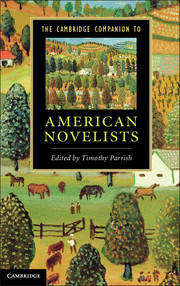Book contents
- Frontmatter
- Contents
- Contributors
- Introduction
- 1 James Fenimore Cooper
- 2 Nathaniel Hawthorne
- 3 Herman Melville
- 4 Harriet Beecher Stowe
- 5 Mark Twain
- 6 Henry James
- 7 Edith Wharton
- 8 Theodore Dreiser
- 9 Willa Cather
- 10 F. Scott Fitzgerald
- 11 Ernest Hemingway
- 12 William Faulkner
- 13 Henry Roth
- 14 Djuna Barnes
- 15 Zora Neale Hurston
- 16 Richard Wright
- 17 Raymond Chandler
- 18 Ralph Ellison
- 19 J. D. Salinger
- 20 Patricia Highsmith
- 21 Vladimir Nabokov
- 22 Jack Kerouac
- 23 Saul Bellow
- 24 Kurt Vonnegut
- 25 John Updike
- 26 Thomas Pynchon
- 27 Toni Morrison
- 28 Philip Roth
- 29 Don DeLillo
- 30 Cormac McCarthy
- Guide to Further Reading
- Index
- References
30 - Cormac McCarthy
Published online by Cambridge University Press: 05 December 2012
- Frontmatter
- Contents
- Contributors
- Introduction
- 1 James Fenimore Cooper
- 2 Nathaniel Hawthorne
- 3 Herman Melville
- 4 Harriet Beecher Stowe
- 5 Mark Twain
- 6 Henry James
- 7 Edith Wharton
- 8 Theodore Dreiser
- 9 Willa Cather
- 10 F. Scott Fitzgerald
- 11 Ernest Hemingway
- 12 William Faulkner
- 13 Henry Roth
- 14 Djuna Barnes
- 15 Zora Neale Hurston
- 16 Richard Wright
- 17 Raymond Chandler
- 18 Ralph Ellison
- 19 J. D. Salinger
- 20 Patricia Highsmith
- 21 Vladimir Nabokov
- 22 Jack Kerouac
- 23 Saul Bellow
- 24 Kurt Vonnegut
- 25 John Updike
- 26 Thomas Pynchon
- 27 Toni Morrison
- 28 Philip Roth
- 29 Don DeLillo
- 30 Cormac McCarthy
- Guide to Further Reading
- Index
- References
Summary
Cormac McCarthy’s (1933–) significance, particularly in his pre–Border Trilogy writings, lies in the refusal of his fiction to be significant, to be meaningful, in the way that American literature generally has intended. His work shies away from depictions of thought or interior mental space, leaving his readers to sort out the motivations of the characters on their own. His language is at times baroque (most notably in Blood Meridian [1985]), at other times stripped back and minimal (Child of God [1973] or The Road [2006]). At the same time, McCarthy is remarkably expert at appropriating the traditions of American fiction in a way that acknowledges them even as he employs them to new effect. He does this sometimes by simply pushing a mode or genre to its extreme. His novel Outer Dark (1968), for instance, toys with the traditions of southern gothic but does so as if the South were actually hell. Blood Meridian imitates the western even as McCarthy cross-pollinates this genre with the spirit of intense viciousness and gnostic philosophy. McCarthy seems both to be bringing one era of American literature – an era tied to more stable notions of character, self, genre, ethics, and order – to a close and to be opening another, this one more interested in the possibilities of pushing the forms and styles to which we are accustomed in new directions.
There is little to suggest this will be the case in McCarthy’s first novel, The Orchard Keeper (1965), which, when it appeared was described as “sorely handicapped” by its “humble and excessive admiration for William Faulkner,” a writer to whom McCarthy is often compared for better or for worse. The first of four novels set in Tennessee before McCarthy turned his gaze to the American West, The Orchard Keeper concerns three characters and a corpse. The corpse is that of young John Wesley Rattner’s father, killed by Marion Sylder and dumped on Rattner’s uncle’s property.
- Type
- Chapter
- Information
- The Cambridge Companion to American Novelists , pp. 301 - 310Publisher: Cambridge University PressPrint publication year: 2012

